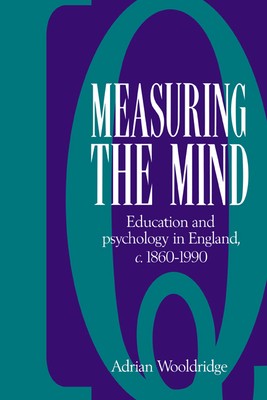
- We will send in 10–14 business days.
- Author: Adrian Wooldridge
- Publisher: Cambridge University Press
- ISBN-10: 0521026180
- ISBN-13: 9780521026185
- Format: 15.2 x 22.9 x 2.6 cm, minkšti viršeliai
- Language: English
- SAVE -10% with code: EXTRA
Reviews
Description
The central claim of Measuring the Mind is that, contrary to popular opinion, the psychologists who dominated educational policy-making between the wars were educational progressives and political radicals. They argued that education should reflect the requirements of children rather than the convenience of adults, and regarded intelligence testing as an instrument of child-centered education. These psychologists owed their political inspiration to the meritocratic ideal and lost popularity with the waning of this ideal after the war. Four main themes dominate the discussion: the emergence of educational psychology as a distinct discipline; the recent history of ideas about children's mental developments; the role of experts in formulating educational policy; and the rise and fall of the measurement of merit.
EXTRA 10 % discount with code: EXTRA
The promotion ends in 23d.20:28:26
The discount code is valid when purchasing from 10 €. Discounts do not stack.
- Author: Adrian Wooldridge
- Publisher: Cambridge University Press
- ISBN-10: 0521026180
- ISBN-13: 9780521026185
- Format: 15.2 x 22.9 x 2.6 cm, minkšti viršeliai
- Language: English English
The central claim of Measuring the Mind is that, contrary to popular opinion, the psychologists who dominated educational policy-making between the wars were educational progressives and political radicals. They argued that education should reflect the requirements of children rather than the convenience of adults, and regarded intelligence testing as an instrument of child-centered education. These psychologists owed their political inspiration to the meritocratic ideal and lost popularity with the waning of this ideal after the war. Four main themes dominate the discussion: the emergence of educational psychology as a distinct discipline; the recent history of ideas about children's mental developments; the role of experts in formulating educational policy; and the rise and fall of the measurement of merit.


Reviews